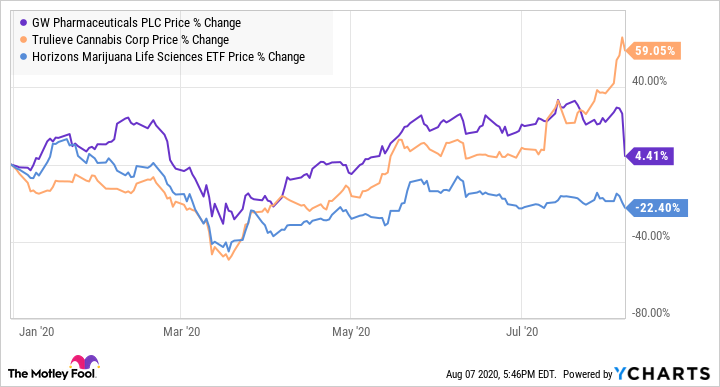Despite the growing popularity of cannabis, there’s limited information about what the substance can and cannot do. And with marijuana classified as a Schedule 1 substance in the U.S., it’s nearly impossible for researchers to conduct studies on it. In Canada, however, pot’s legal for both medical and recreational use. Researchers there are hopeful that a new study could help answer some of the uncertainties surrounding cannabis and its effectiveness in treating various ailments.
There’s lots of anecdotal evidence of cannabis helping alleviate various ailments. The Food and Drug Administration (FDA)’s even approved a cannabis-based drug made by GW Pharmaceuticals (NASDAQ:GWPH): Epidiolex. It’s the only FDA-approved drug that’s derived from cannabis and it can treats children with two rare forms of seizures — Dravet syndrome and Lennox-Gastaut syndrome. And the FDA recently approved it for a new indication: treating seizures due to tuberous sclerosis complex. Trulieve Cannabis (OTC:TCNN.F) is another top medical marijuana company and it has benefited from tremendous growth in its home state of Florida. More than 380,000 patients there hold marijuana cards, which is up 28% since the beginning of the year. But despite the demand for medical marijuana, there are still many people who doubt its effectiveness, and that’s why more research and studies are necessary.
An effort to achieve real-world results
The University Health Network (UHN) in Canada is embarking on a six-month study that aims to put some solid data behind claims that cannabis can help patients. The Medical Cannabis Real-World Evidence Study is seeking to enroll at least 2,000 people who have been prescribed medical marijuana for certain conditions including chronic pain, sleep, anxiety, and depression. The study will utilize a portal run by Canadian pharmacy retailer Shoppers Drug Mart that contains accurate and reliable information about the medical cannabis products it sells including dried flower, oils, extracts, edibles, and topical preparations. Patients will select cannabis products from the platform and then report on the product’s effectiveness in treating their symptoms.

Image source: Getty Images.
One of the most important aspects of this study is that patients can have confidence in the accuracy of the cannabidiol (CBD) and tetrahydrocannabinol (THC) levels in every product. Through the use of blockchain and seed-to-sale tracking technology, Shoppers is able to obtain detailed information and chemistry related to a specific product. Knowing the specific strain that’s in a product and its effects on an individual with a particular illness can help to specifically identify what works and what doesn’t under varying circumstances.
However, one of the important limitations of this study is that there isn’t a control group. It’s also dependent on the information that patients report regarding the effectiveness of a particular product. As a result, the data that’s collected can be very subjective and won’t contain the conclusive data that a true scientific study would otherwise provide. In effect, it’s more of a database of patient responses and assessments of various products.
Why the study is important
For medical marijuana companies like GW and Trulieve, positive results from this study, even though they may only be anecdotal, can help drive demand for their products if companies know which types of products are likely to be effective in treating patients with certain conditions. And if the study helps convince the FDA that cannabis may be safer than the agency thinks it is, that would be a big step forward for the cannabis industry.
The FDA, despite permitting Epidiolex for use, still has doubts about CBD, the compound in cannabis that’s often associated with its health benefits. It issued a warning in November 2019 stating there were many concerns surrounding the safety of CBD.
Although there isn’t a control group in this study to gauge the safety of cannabis, if the patient’s responses from the study are overwhelmingly positive and they report no adverse side effects from using the products, it could at the very least make a case that certain products and strains are safe. The study likely won’t change the FDA’s mind but it could go a long way in encouraging more patients to try cannabis, especially those who may be on the fence. And that, in turn, could help marijuana companies like GW and Trulieve continue to grow their sales.
In 2019, GW reported sales of $311 million in the first full year that Epidiolex was on available, up from just $13 million in the previous year. Trulieve’s revenue last year topped $253 million and grew by 145% despite focusing on just one state.
What does this mean for investors?
The study is still currently accepting patients and doesn’t have a set start date. It could be well into next year before the study’s complete and researchers are able to analyze and process the findings. It’s something for investors to keep an eye out for as positive results from the study, regardless of whether they sway the opinion of the FDA or health officials.
For now, it’s still the status quo for investors of GW and Trulieve. Both pot stocks are continuing to perform well and are generating strong sales numbers and remain great buys. Year to date, the stocks are both in positive territory and are outperforming the Horizons Marijuana Life Sciences ETF (OTC:HMLS.F) by wide margins.
As certain cannabis companies continue to make headway in their total addressable market, pot stocks will probably rise in step with growing sales. And if U.S. federal legalization ever comes to pass, most marijuana stocks will shoot up in a hurry.
